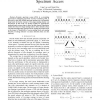Free Online Productivity Tools
i2Speak
i2Symbol
i2OCR
iTex2Img
iWeb2Print
iWeb2Shot
i2Type
iPdf2Split
iPdf2Merge
i2Bopomofo
i2Arabic
i2Style
i2Image
i2PDF
iLatex2Rtf
Sci2ools
ICC
2008
IEEE
2008
IEEE
A Two-Stage Sensing Technique for Dynamic Spectrum Access
—Dynamic spectrum access (DSA) is a promising approach for mitigating spectrum scarcity. Underlying DSA is the need for fast and reliable spectrum sensing over a potentially large band. In [4], the concept of two-stage sensing scheme was introduced. In this work, we develop models for performance analysis based on mean time to detect an idle channel. Simulation results show that two-stage sensing leads to faster detection than conventional single-stage random search. System-level issues such as the impact of bandwidth of coarse sensing block and sensing duration of energy detector on mean detection time are also explored.
Related Content
| Added | 30 May 2010 |
| Updated | 30 May 2010 |
| Type | Conference |
| Year | 2008 |
| Where | ICC |
| Authors | Ling Luo, Sumit Roy |
Comments (0)

